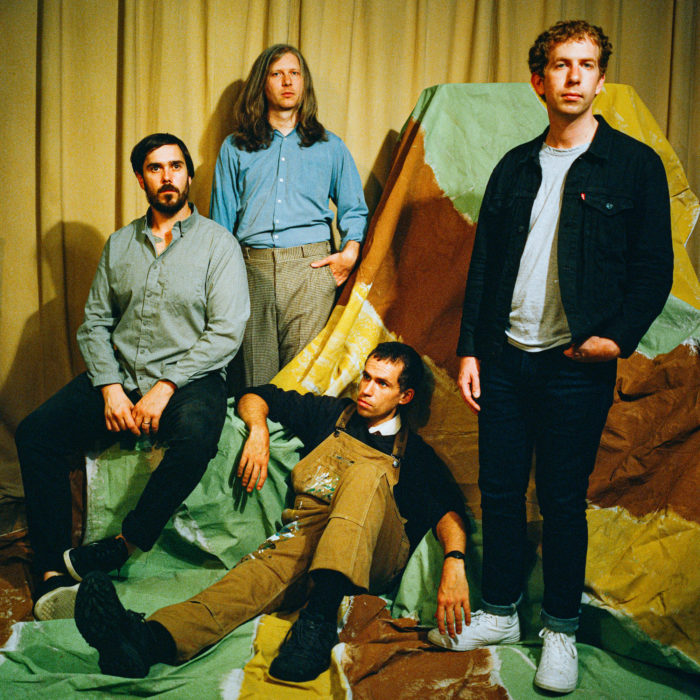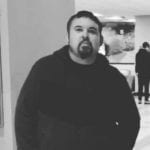
“The priority is just touring this record around as hard as we can.”
Very few indie rock bands throw a party like New York City’s Parquet Courts. Rooted in punk harkening back to the style’s artsy CBGB era, the quartet of guitarist and co-vocalist Andrew Savage, multi-instrumentalist and co-vocalist Austin Brown, bassist Sean Yeaton, and Savage’s younger brother Max on drums are constantly incorporating new sounds on their projects.
For example, their latest album Sympathy For Life has rhythms reminiscent of the atmosphere you might find at a rowdy NY venue. At the same time, the cacophony doesn’t overwhelm, as it stays true to the heart of what the band does.
Folks will get the full experience when Parquet Courts rock Royale in Boston on March 31. Leading up to that, I spoke with Yeaton ahead of the show about improvised jams, getting out of the city to make new music, each record having a live identity and a recorded identity, and getting back to touring all over the planet after a tumultuous couple of years due to COVID-19.
Sympathy For Life seems to be a continuation of Parquet Courts’ fusion of dance rhythms and the energy that often comes from bringing EDM into a rock structure. With that in mind, how would you describe the songwriting and recording process for this album?
We wanted to extend the similar vibe we had in our previous album Wide Awake but we did it in a different way through fleshing out these improvised jams we were having. We eventually trimmed them down to being legit songs and we always knew that they were going to be somewhat dancey.
Our vision over the past few years has been heavily influenced by the New York City club scene and we enjoy that feeling so much that we want to put it towards a rock sound. We were also listening to a lot of Primal Scream and Pink Floyd while writing the music for Sympathy For Life as well so they both had an influence. Ultimately I’ve been describing the process to people as us kind of DJing our own music or something along those lines.
Like your other albums Sunbathing Animal and Human Performance, you guys went up to the Catskill Mountains for the recording sessions. What was it like?
It was so good, we recorded in a bunch of studios for this record but they all had that in common. We like to get out of the city and really be in more isolated situations whenever we record to be kind of limited as to what could affect our process. We really like to get into it and be in 24/7 recording mode so being in that setting was perfect for us so we could focus our attention on the process. Whether it’s the Outlier Inn in the Catskills or Real World Studios in England, being somewhere that allows us to potentially do nothing other than making music and listening to music is really good for how we like to approach things.
One thing I really noticed with the songs in the latest album is that there’s a lot more backing harmonies than before. Was this simply for the sake of having the entire band involved in the music rather than either Andrew Savage or Austin Brown taking the lead on vocals?
I guess that it’s sort of like any other instrument. Throughout the history of the band we’ve all gotten a little better at our instrument while being interested in other instruments such as synthesizers and just different processes. It’s still such a fun experience with that sort of discovery aspect of being in a band together so I think the added vocal harmonies is kind of an extension of that. It was never prioritized necessarily because maybe we weren’t confident enough that we’d be able to do the kind of things that we wanted to pay respect to or emulate. We’re basically a punk band trying to do this so I think it’s just us showing that we’re more confident in taking on those kinds of additions to songs.
It’s nice to have everybody’s voice in there, we’ve all sort of sung in some capacity, but I do get what you’re saying. There is much more of that being filled out on this record and I think it’s the four of us simply getting better at doing stuff like that.
With most of the album being written and recorded before the COVID-19 pandemic, did you guys spend a lot of 2020 and 2021 trying to figure out a good time to release it in the absence of live music or did you decide to be patient from the get go?
It was really weird and hard for us as a band that is pretty consistent when it comes to our workflow and scheduling. Usually we’ll write a record, record a record, tour in support of the record, and just repeat that process. Most of the time, while we’re touring in support of a record, we’re already working on the next one, then we’re going to be recording and it’s all systematic for us so obviously COVID-19 kind of threw us off. I do think that we lucked out in a way that we already knew that the record wasn’t going to come out in a regular fashion. We literally finished tracking three days before the first lockdown; even when it all started we had to go through the mixing and mastering so we knew it was going to be a while before it came out anyway.
Then when [the pandemic] started to be getting as long as it was, we reached the point where we were kind of more willing to wait and let this record have its opportunity to be performed in its live version. It’s something that’s been prioritized as an importance for all of Parquet Courts’ records, we want each one to have a live identity and a recorded identity. That’s where we’re at now.
What are your plans for the coming months? Do you just plan on doing a ton of touring for a while or is there anything else in the works?
We’re going to be on tour for the rest of the year. We’re going to see the whole world and that’s really the priority for us right now, just kind of like making sure that we’re able to do it. We’ve been a bit rusty for the past couple of years but we’ve been able to play a few shows and we’ve been rehearsing. We recently rehearsed for two days where we got to link up with the people that are going to be doing lighting for us on tour and it’s all coming back together again, so for us the priority is just touring this record around as hard as we can.
Parquet Courts at Royale, March 31. Tickets at royaleboston.com
Rob Duguay is an arts & entertainment journalist based in Providence, RI who is originally from Shelton, CT. Outside of DigBoston, he also writes for The Providence Journal, The Connecticut Examiner, The Newport Daily News, Worcester Magazine, New Noise Magazine, Northern Transmissions and numerous other publications. While covering mostly music, he has also written about film, TV, comedy, theatre, visual art, food, drink, sports and cannabis.

